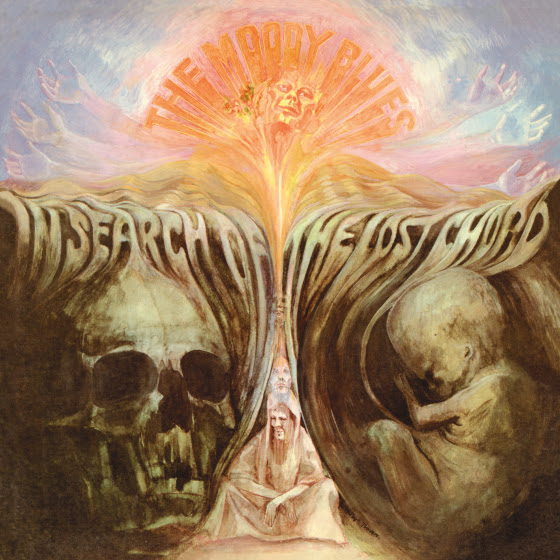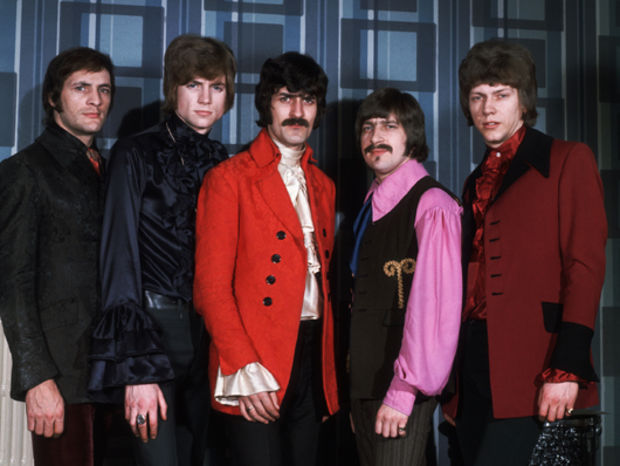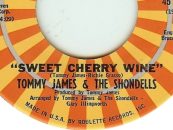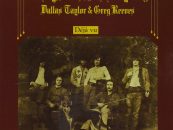 The Moody Blues—originally the R&B/pop group that produced the top 10 hit “Go Now”—took a big leap with November 1967’s Days of Future Passed, an ambitious concept album that they made in collaboration with a full orchestra. Eight months later, they took another jump with In Search of the Lost Chord: perhaps realizing that touring with an orchestra wasn’t practical, they replaced it with Mellotrons played by members Mike Pinder and Justin Hayward, not to mention everything from flutes, saxes and harpsichords to cellos, sitars and tablas. “Although we’d used an orchestra on the previous record, we all felt that we should be self-reliant with our next work,” the group’s John Lodge later said. “So if we wanted to use a particular instrument on a track, one of us would figure out how to play it.”
The Moody Blues—originally the R&B/pop group that produced the top 10 hit “Go Now”—took a big leap with November 1967’s Days of Future Passed, an ambitious concept album that they made in collaboration with a full orchestra. Eight months later, they took another jump with In Search of the Lost Chord: perhaps realizing that touring with an orchestra wasn’t practical, they replaced it with Mellotrons played by members Mike Pinder and Justin Hayward, not to mention everything from flutes, saxes and harpsichords to cellos, sitars and tablas. “Although we’d used an orchestra on the previous record, we all felt that we should be self-reliant with our next work,” the group’s John Lodge later said. “So if we wanted to use a particular instrument on a track, one of us would figure out how to play it.”
The resulting album, released on July 26, 1968—which, like its predecessor, was (in 2018) expanded into a lavish 50th anniversary set—didn’t sit any better with the critics than Days of Future Passed. Rolling Stone (no fan of the group in general) ultimately gave it one-and-a-half stars, where two stars mean recordings that “are failures” and one star signifies LPs that are “wastes of vital resources” that should interest “only masochists.”
What can you say? Maybe that half a century later, the Moodys have sold 70 million records, are (finally) in the Rock and Roll Hall of Fame, and remain popular enough to have prompted the release of this anniversary box. That said, the critics got one thing right: some of the lyrics on this concept album—which focuses on spiritual and philosophical concerns—sound dated or downright puerile. But the lion’s share of the music holds up.
Let’s first address the stoned elephant in the room: if ever the Moodys made an LSD album, this was it. You don’t have to venture beyond the opening lines of the first track to sense that the drug has taken effect: the album begins with a spoken bit about “the sight of a touch or the scent of a sound” that dissolves into stoned laughter.
By the second number, the Moodys are inviting you to “take this trip” and, in case you still haven’t caught on by the fifth track (“Legend of a Mind”), it pays tribute to Timothy Leary. (“He’ll take you up, he’ll bring you down…He flies so high, he swoops so low…he’ll bring you back the same day.”)
The catchy, well-constructed song features a great flute-spiced instrumental interlude.

Moody Blues in the late ’60s
The lyrics, which contain references to mysticism and meditation as well as to drugs, sometimes border on the incomprehensible, such as in “The Word,” which offers these spoken lines: “This garden universe vibrates complete/Some, we get a sound so sweet/Vibrations reach on up to become light/And then through gamma, out of sight/…To know ultraviolet, infrared, and X-rays/Beauty to find in so many ways.” Verse like that will transport you back to 1968, leave you scratching your head, or both.
The good news, as noted earlier, is that much of the music is excellent. There are a few brief throwaways, such as the spoken “Departure” and “The Word” as well as “Dr. Livingstone, I Presume.”
But Justin Hayward’s vocals on songs like the lilting “Voices in the Sky” are as captivating as his work on the earlier “Tuesday Afternoon” and “Nights in White Satin.” The two-part “House of Four Doors” is strong as well.
Songs like these sound better than ever on the album’s new 50th anniversary edition, which contains three CDs, two DVDs and a 76-page book that features notes, credits, period concert reviews, lyrics and photos of the group and assorted memorabilia. The CDs deliver a remastered version of the original album mix, a punchier new mix and a host of other goodies. Among them: five period singles (four versions of tracks from the LP, plus a Pinder B-side called “A Simple Game” that the Four Tops, of all people, later covered); a mono mix of “Legend of a Mind”; BBC Radio One live versions of four tracks from the album and “Tuesday Afternoon”; and alternate mixes of six songs.
Also here are several numbers from the Lost Chord sessions that remained unavailable until they were tacked onto a concert release, 1977’s Caught Live + Five: “King and Queen,” one of the Moodys’ most beautiful early creations; the antiwar “What Am I Doing Here”; and “Gimme a Little Something.”
The DVDs offer perhaps the strongest enticement for owners of the 1968 album to upgrade. One offers color and black-and-white videos, from BBC-TV and elsewhere, of seven of Lost Chord’s songs, plus four others, including “Tuesday Afternoon” and “Nights in White Satin.” The audio-only other DVD, meanwhile, features a high-resolution 5.1 mix of the original record. Especially if you’ve been listening to this music on a scratchy vinyl LP for the last 50 years, you’re bound to find the surround-sound version to be, um, a real trip.
Listen to the classic “Ride My See-Saw,” a minor hit from the album but long a fan favorite
Related: We look back at Days of Future Passed






12 Comments so far
Jump into a conversationThe reviewer must not have listened closely to Disc 4 (5.1 mix). Did he notice that the “spuknik” sound at the end of The Best Way to Travel was missing? Instead, in the surround channels you can hear Mike Pinder singing a verse of the song. By the third line, it is out of time with the rest of the music.
Another problem. On Disc 2, the Problem with The Best way to travel is repeated, as disc 2 is a 5.1 to stereo reduction mix. Also, Voices in the Sky is in Mono on Disc 2. Did the Moodies review this product before Universal put it out? I don’t think so.
I never thought of “Dr. Livingstone, I Presume” as any sort of throwaway. It is whimsical, and perhaps for that reason isn’t always taken very seriously. But it fits into the concept of the record as a whole. The album is a journey, as implied by the title. Among English schoolboys in the 1940’s and 50’s, the most well-known explorers would be the ill-fated David Livingstone, the equally ill-fated Robert Scott, and, for what he’s worth today, Christopher Columbus — all of whom are namechecked in the song — and none of whom actually found what they set out to discover. The song’s refrain of “we’re all looking for something” is something of a universal truth. The song points out that even these famous people — and by implication many others — are always in search of something bigger than themselves. Eventually the album seems to deliver the listener to the destination in the last 3 tracks, but “Dr. Livingstone, I Presume” is an essential step along the way.
While “Dr. Livingstone” is not one of my favorite Moody’s tracks, I have to agree with John Rose that it has it’s cumulative place on this conceptual recording. As soon as you begin trying to pick apart or criticize any of the Moody’s songs you’re going to get an argument from many people as, over the first seven albums, especially, the band presented such a tapestry of songs, sounds, and visions created in the mind that are beloved by so many people, that holding up any specific parts of any of them for scrutiny begins to unravel the beautiful whole. For myself, and speaking generally, Ray Thomas’ songs are not my most favorite parts of the Moodys’ albums, with a number of marvelous exceptions. But they are also intricate and valued parts of the band’s multifarious persona, much as George Harrison was to the Beatles, though in this case, I’d say Mike Pinder was much more the George Harrison of this group. Which brings me to probably the real reason I’m writing this, which is your reference to “The Word” as an additional throwaway track. In a sense, I feel it’s a bit useless to try to explain why it’s not, because, with regard to the Moodys, you either get it, or you don’t. There’s no doubt that at first listen their whole sound and approach can come across a bit schmaltzy, but for those listeners who’s rational consciousness about music never allows them to get beyond this, you’re missing a beautifully poetic vision of life crafted by words and sounds into a fantasy scape of a communal spiritual existence that gives their devoted followers the hope and dream that something better than the hardness of everyday life does exist. When you think about it, that’s an amazing achievement from a group of young men who called themselves a Rock n’ Roll Band. It’s also an achievement of which I can think of no parallels by any other group or single musical artist. “In Search Of The Lost Chord” stands on its own as a musically historic recording. But for Moodys fans, it’s just one fabric in the expansive sonic tapestry of their concepts about what it actually is to be alive.
everything i was gonna say was said by DA MICK…. only better!
To say that the writer of this music missed the whole point is an understatement! This album like the core 7 albums of the Moody Blues is not only gorgeous in lyric, melody, poetry and verse but the harmonies, the instrumentation, one of the first rock groups to play with a full orchestra! My God, do any research on the group or just write your limited opinion? The moodiest were decades ahead of their time and if you were around in the late 1960s and 1970s you would know Rock and then Prog was all about consciousness raiding and the MESSAGE in the music! Mike Pinder, Justin Hayward, who lyrics are truly beautiful as is his voice, John Lodge who write House with 4 Doors and Graeme Edge the poet drummer and Rays ethereal flute leaves the listener stunned, amazed, enlightened and in total bliss with ear candy of the most unique kind! I have listen loved and learned so much from their (acid trip lyrics- what a horrible way to minimalist them!!!) for 50 plus years and I still love them all their solo projects are great too! Too bad you missed the entire point of the greatest band in Prog or Rock The Moody Blues! Awards, Ivor Novellas, outstanding record sales and filled concert venues tell a very different story to what you write and yes, the idiots at the RRHOF finally let them in but they were qualified decades ago! Listen to beauty and hear the WORD with all their albums!
Mr. Burger apparently doesn’t have much of a clue about The Moody Blues. He’d likely make a great addition on the staff of Rolling Stone, however.
mr burger is the first person writing for BCB that i thought was clueless. go back for another listen… ’cause you missed the point, mr burger…
Like many others, I found the 5.1 mix disappointing. Considering that Black Sabbath and Yes (and many others) have excellent DVD-A releases, you gotta wonder.
Also, “Departure” is not what I would call a “throwaway”. One of the oldies station in town plays “Departure” with “Ride My See-Saw”. The other one plays the 45.
The Moodies have not been well-served in their re-releases. I wonder if the original tapes burned in the great Universal Fire of 2008. Those bozos responsible should be swingin’ from the Gallows Pole.
True Moody Blues fans would not still be listening to scratchy vinyl LP for 50 years, with the advent of CD’s and all, duh! Hello Mr. Burger.
Have heard some of the so called “remastered” Moody Blues CD’s, and the poor sound quality, are to be avoided.
The MFSL (Mobile Fidelity Sound Labs) releases of Moody Blues albums are of the highest quality, the “original master recording” being the source.
Any true Moody Blues fan and audio aficionado would already have the MFSL releases in their music collection.
Agreed, this article by Mr. Burger apparently doesn’t have much of a clue about The Moody Blues.
To all of you who commented, you made my day! So happy to know there are so many true Moody Blues fans out there that will voice their opinions regarding this article.
I could never (and I do mean this) have said it better.
I was around in the 60s and 70s when this stuff was new and it was as good as anything else coming out by other bands at the time. As for Rolling Stone not liking them, Bummer! I learned early on to pretty much ignore anything that they had to say about anything. So did a lot of others. Pandering and self-congratulating are terms that come to mind when I think of them.